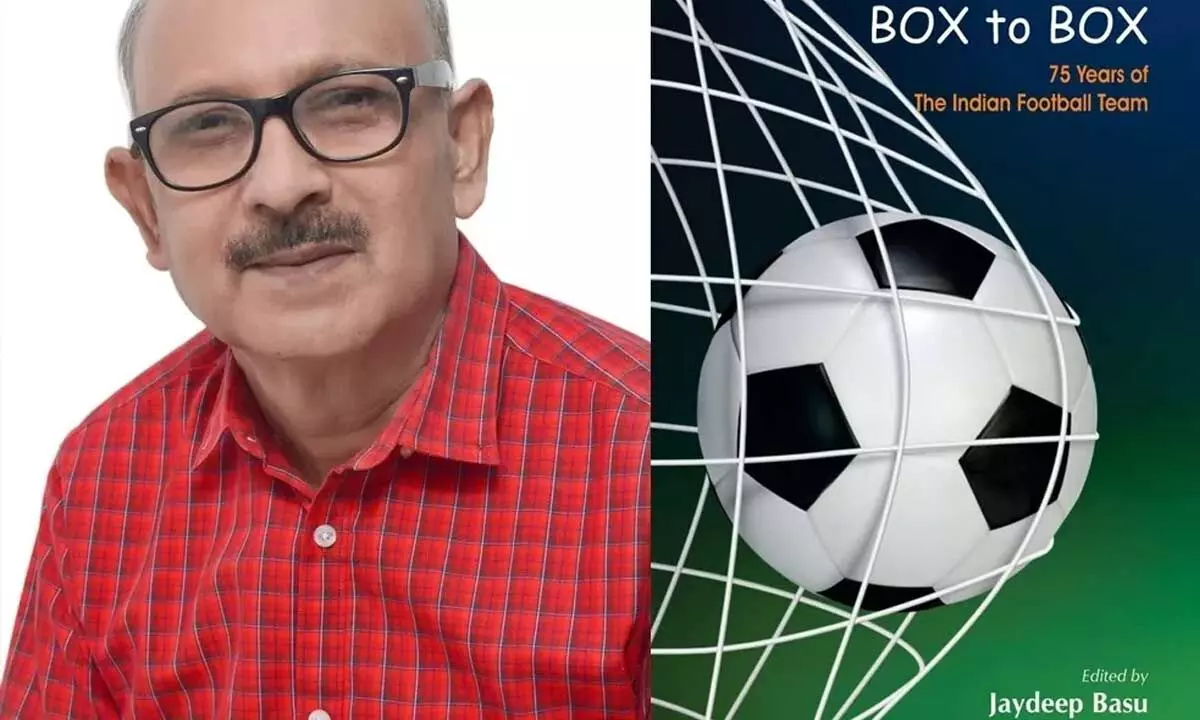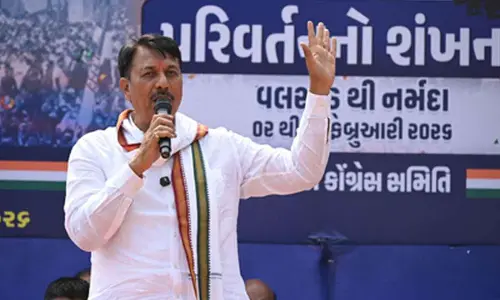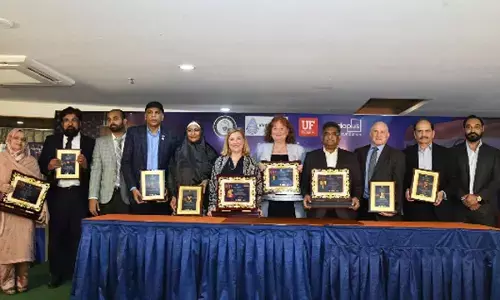India playing in Football World Cup a distant dream

India playing in Football World Cup a distant dream
India got a shot at playing in the Football World Cup way back in 1950 but backed out for reasons that are still not exactly clear and its chances of reaching the pinnacle are a distant dream but there is some hope for the revival of the game in the country with a new dispensation in place though it's too early to predict the future, says veteran sports journalist Jaydeep Basu, who has edited a book titled "Box to Box" that traces the highs and the lows of the game in the country in the past 75 years.
India got a shot at playing in the Football World Cup way back in 1950 but backed out for reasons that are still not exactly clear and its chances of reaching the pinnacle are a distant dream but there is some hope for the revival of the game in the country with a new dispensation in place though it's too early to predict the future, says veteran sports journalist Jaydeep Basu, who has edited a book titled "Box to Box" that traces the highs and the lows of the game in the country in the past 75 years.
"In my humble opinion, India playing the World Cup is still a distant dream. It will take many, many years to achieve, unless some drastic changes come in Indian football," Basu said.
Do you see the new dispensation in the AIFF (All India Football Federation) turning around the fortunes of the game?
"The current body has been elected less than a month ago. So, we have to wait and see," Basu responded.
After a prolonged series of events, that even saw the intervention of the Supreme Court, FIFA, the worldwide governing body of the sport, suspended the AIFF on August 15 for violating its statutes on third-party interference in its management. India was also stripped of its hosting rights for international tournaments, including the U-17 Women's World Cup in October. The suspension was lifted on August 27, following which the tournament will be held as scheduled.
In the elections held on September 2, as mandated by the Supreme Court, Kalyan Chaubey, a former India goalkeeper and currently a member of the BJP, was elected the AIFF President, defeating former India captain Bhaichung Bhutia by a lopsided 33/1 margin and ending the 14-year reign of NCP politician Praful Patel.
Choubey, in fact, is the first footballer to head the AIFF and certainly has his hands full with Bhutia himself suggesting a way forward, harkening back to a time when the Santosh Trophy, the IFA Shield. the Durand and the DCM Cup and clubs like JCT and Premier Tyres were the feeding grounds for Indian football. Then came the I-League and the ISL Today, the Santosh Trophy, the National Football Championship, is almost extinct.
"We have not got the domestic structure right as yet. The structure is yet to get sorted more so with the Indian Super League (ISL) coming in," Bhutia says in an interview in the book.
"I am hoping that in the next 2/3 years, the domestic structure will be settled where the ISL and I-League will have more teams and we could have a 7-8 month-long season.
"The absence of a domestic league structure is definitely going to hamper the game in the long run. I feel there should be a domestic league structure from where players can be spotted to play for ISL or I-League and then for India. It is important to have a domestic league structure," Bhutia asserts.
"Bhaichung is very right in his observations. The newly-elected body of the All India Football Federation is now trying to bolster the domestic football system and has announced plans to revive old tournaments you are talking about. So, let us see where it goes," Basu said.
As for the 1950 World Cup fiasco, this is best described in an article titled "Were India banned (from the tournament) for wanting to play barefoot" by Peter Jones that appeared on July 11, 2018 on worldfootballindex.com: "It appears that the main reason was the AIFF delaying a decision on whether they would attend, this delaying tactic provided them with free travel courtesy of FIFA, and perhaps they were waiting for further benefits before the opportunity passed them by."
Basu terms this "The Blunder Of the Century" just two years after India had appeared for its maiden Olympic football match against France at the 1948 London Games which they lost by a last-minute goal. This is what was written for "All India Football 1945-50" by an eminent soccer critic of England today who is also the sports chief of a leading English daily and who prefers to remain anonymous:
"India lost the match which she should have won. Her defence was sound, with not one weak link. Her forwards were clever and better masters of sprinting and dodging. They went through the 90 minutes of play without visibly tiring although they looked frail in comparison with their heftier rivals. Where they failed was in shooting at the goal. Once they make up this deficiency, it will have to be very very strong national side that would be able to beat the Indians. They have evolved a technique which baffles the Western player and makes his physical superiority appear futile," the critic wrote.
It's a different matter that just eight years later, India finished fourth at the 1956 Melbourne Olympics, the highest they have achieved at the international level, not counting regional tournaments like the Asian Games.
Alas, while India were the champions of Asia in the 1960s, the book maintains that "narrow political considerations caused irreparable damage to its fortunes in the 1970s" and narrates "how the game was undermined in the country in the 21st century and forced by unscrupulous officials to toe the line of the corporates".
How did the book come about?
"I wanted to come out with a book on the Indian national football team on the 75th celebration of India's independence. It also coincided with the Indian national team's 75th year as the Indian football team played their first match in August 1948 at the London Olympics. Being a person always keen on history, I have been doing some research on Indian football for the past 30 years. So, I did not have to do much extra work on this book. But at the same time, I spent lots of time selecting the writers and different angles of the national team. The writers in this book are some of the best names in Indian football and I feel proud of them for writing some top class articles," Basu responded.
Basu, who has covered several World Cups, Olympics and Asian Games, is also the author of "Stories From Indian Football". What next? What's his next book going to be on?
"I have not set a target yet. But yes, I have plans to write more on Indian football," Basu concluded.














